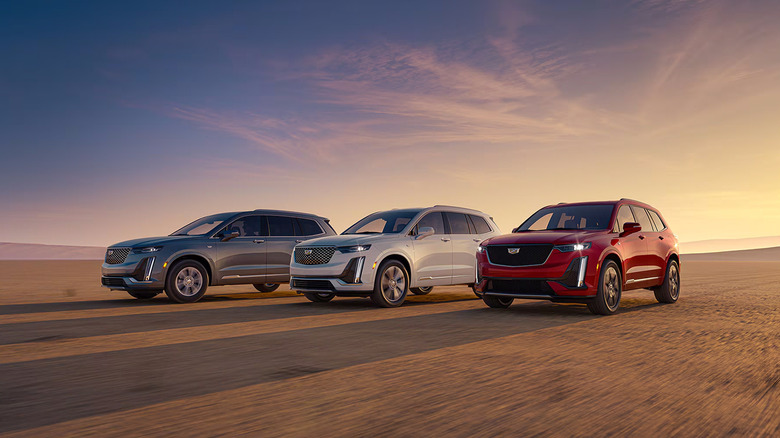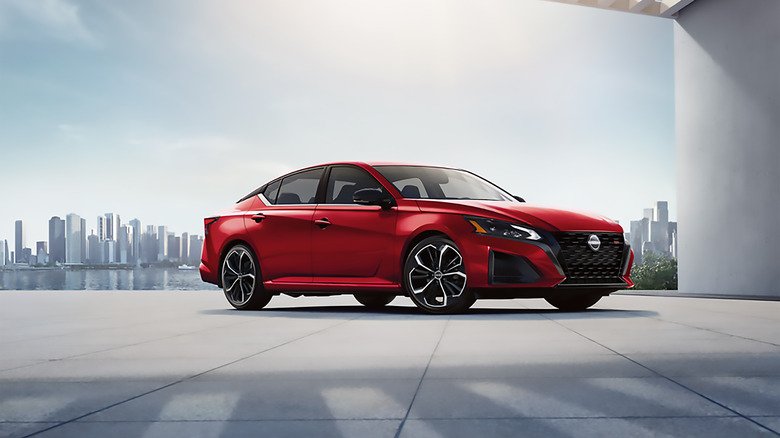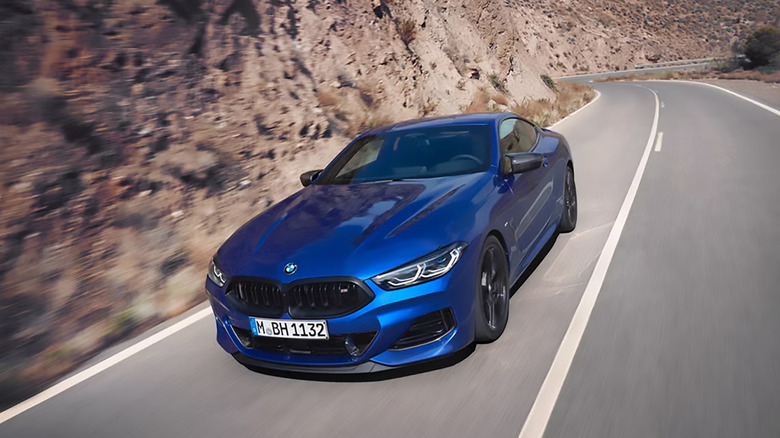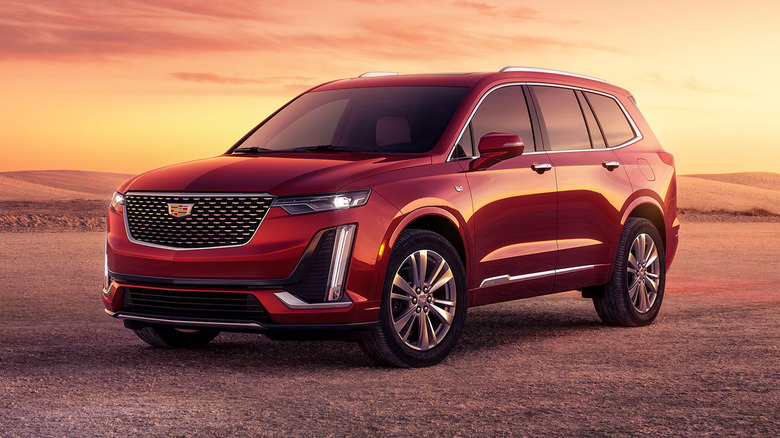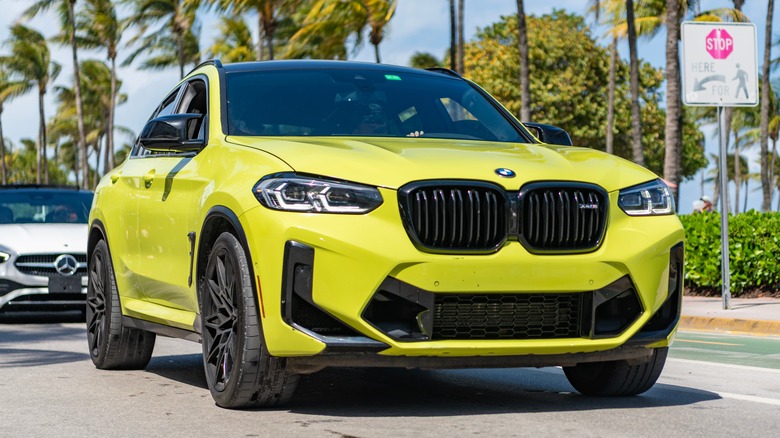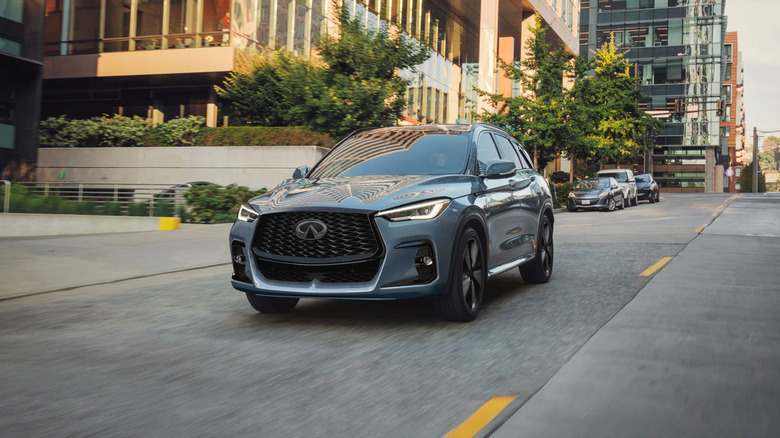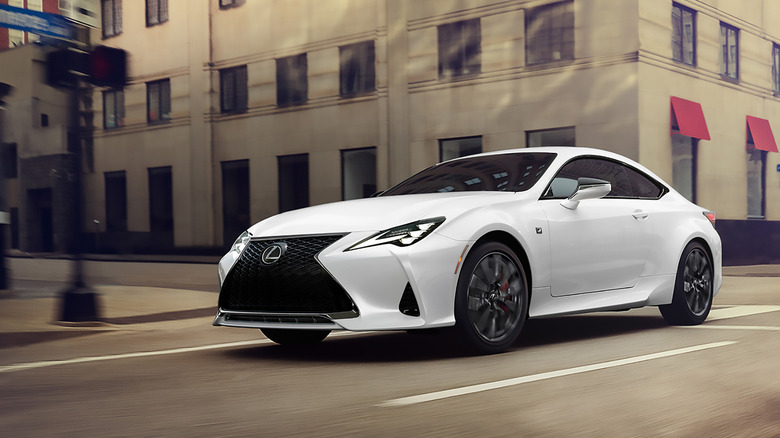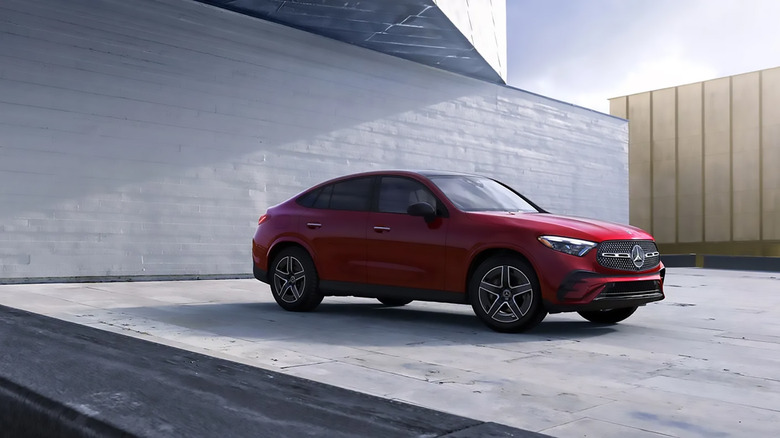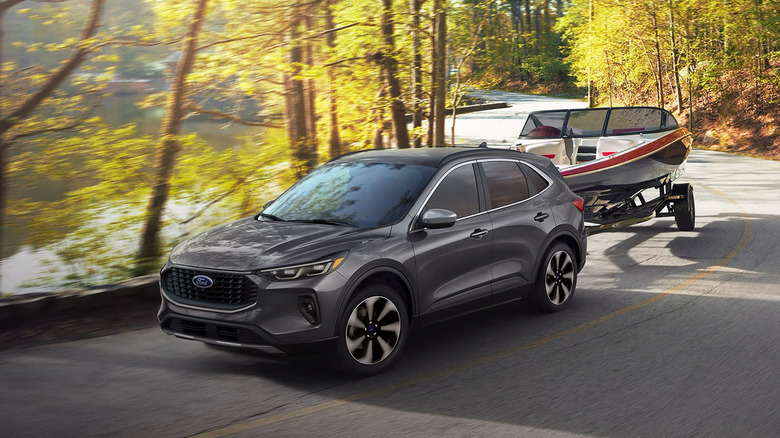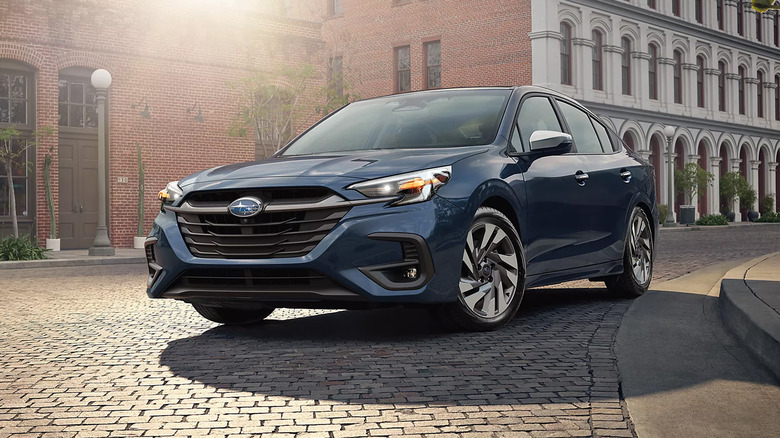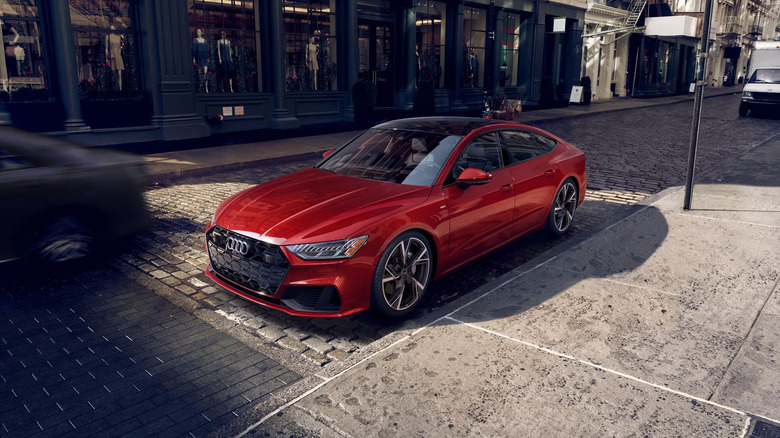13 Cars Predicted To Be Discontinued By 2026
There can be multiple reasons why manufacturers decide to discontinue some models in their lineup, whether it's due to declining sales of a particular car, industry trends, or government policies that make it financially impossible to keep them in production. Alongside the ever-growing demand for crossovers and SUVs on the U.S. market, electrification has become even more prevalent, leading to some of the long-standing gas-powered models from various brands to be phased out, such as the Chevrolet Malibu.
Automakers such as Cadillac originally had the plan to sell electric vehicles exclusively by 2030 or further into that decade, but as sales have decreased, more caution is being taken by keeping gas-powered models in production. Still, we're set to see an abundance of new electrified cars hit dealerships in the coming years, leaving it up to the least successful models to make way for them. It's not always the cars that sell the worst that are being discontinued, however, with brands simply dropping models to adhere to their future targets and ambitions. While you can still buy the following cars new from their respective manufacturers, these 13 nameplates may not be around by 2026, at least not in current guises.
Nissan Altima And Nissan Versa
In recent times, Nissan has found itself in deep financial trouble, struggling to find a new investor/partner after the merger with Toyota fell through. Considering that the Japanese automotive giant was the fifth best-selling brand on the market throughout 2024, it's hard to believe that even the CEO sees bankruptcy as a genuine possibility for Nissan if it fails to find external investments. Looking at the lineup in 2025, Nissan covers plenty of ground with its cars and SUVs, but two of the most popular and versatile models are set to leave the lineup by 2026, for a number of reasons, alongside the brand's obvious financial woes.
The first of the two models is the Altima, which has been the brand's staple mid-size sedan ever since its introduction back in 1993. It sold a total of 113,898 units last year, but Nissan has decided to axe the Altima in favor of its shift to EVs for the near future. The 2025 model is still available, however, with an MSRP of $27,000. Alongside the Altima, the smallest car from Nissan, the Versa, is also set to leave the market by 2026, also partly due to the shift towards EVs. The manual transmission-equipped version has already been reported to have ended production due to low sales and uncertainty with the U.S. Government's tariffs, but the model as a whole isn't predicted to remain as a whole for much longer.
BMW 8 Series
Germany's long-standing reputation of building some of the most iconic cars on the road wouldn't exist without BMW. Rivaling brands like Audi, Mercedes-Benz, and Porsche also deserve credit for maintaining this, but over the decades, it's been incredibly hard for anyone to beat the on-road balance, performance, and practicality that the Munich-based brand has produced. While the M3 and M4 are typically the first models to spring to mind, the larger 8 Series models have been just as competitive in the larger two-door and four-door segments, making it a massive shame to see the nameplate's model start to dwindle.
Recently, BMW discontinued the M8 Coupe variant, leaving the four-door M8 Gran Coupe as the only 8 Series to fall into the M performance division. As of now, the M8 Coupe is the only model that has left the lineup, with the standard 8 Series and M850i trims still being available. However, both the remaining Coupes and Gran Coupes may also not be safe from the brand's reshuffling, with reports suggesting the 8 could be removed from the lineup entirely. BMW is one of the brands that didn't commit as heavily towards an EV-only future compared to other brands, but is still set to roll out plenty of new all-electric models to fill in the gaps left by the likes of the M8 Coupe.
Cadillac XT6
Moving over to the American brands on the market, Cadillac can't claim the title of the best-selling manufacturer, but that can be expected due to its focus on luxury over affordability. One of the four automotive brands under the ownership of General Motors, brands like Chevrolet and Buick take on the role of being affordable, leaving Cadillac to produce some of the most competitive luxury vehicles that rival Europe's best, but still at a lower price point. One of these models has been the XT6, which doesn't compete in the Escalade's territory but has been a key player in the mid-size SUV segment for years. However, as GM's focus changes Cadillac for the brand, the XT6 is set to leave the lineup by 2026 for good.
Cadillac has already introduced a variety of all-electric models, including the Lyriq, Optiq, and Vistiq SUVs, along with electric versions of the Escalade. The brand originally had the goal of selling an all-electric lineup by 2030, but, like many others, it followed industry trends and changed course on that commitment. Still, Cadillac is planning to offer a broad electric lineup, ultimately making the XT6 obsolete. Eladillac XT6, you can still pick one up for an MSRP of $49,195 with a $1,495 destination charge, but it has hardly changed since its introduction in 2020.
BMW X4
As mentioned, BMW is still committed to expanding and diversifying its lineup with a host of new electric vehicles despite not investing in the relatively new technology as much as originally planned. Alongside the various sedans and coupes that remain in production for 2025, BMW also puts an incredible amount of detail into its expansive SUV lineup, which helps the brand reach out into almost all areas of the luxury segment. However, with a list of all-new EVS set to join the lineup by 2030, some models will unfortunately have to make way for them, as the 8 Series is set to do. On the SUV side of the fleet, the X4 is one of the fan favorites that will depart, with no combustion-powered replacement taking its place.
Sitting in the middle of the SUVs that you can buy brand-new from BMW, the X4 starts at $55,300, which isn't exactly cheap but earns the price tag through its solid performance and standard luxury features. With its coupe design style, the next best thing from BMW is the newly refreshed X2, which starts at a lower $42,850 but comes with less power. To fill the gap left by the X4, one of the brand's new EVs will be introduced, aptly named the iX4.
Infiniti QX50 And Infiniti QX55
Acting as the luxury subsidiary brand of Nissan since 1987, Infiniti doesn't have the same reach as neighboring brands such as Lexus, but that can be expected due to having such a small lineup in comparison. Offering just four new SUVs alongside the 2024 Q50 sedan, the two models that have stood out primarily due to their affordability are the QX50 and QX55 SUVs. In 2025, you can buy the former for $43,000 and the latter for $50,150, both with a $1,995 destination charge, but this is set to be the last year that the two entry-level SUVs will be available to buy new.
It's not uncommon for brands to phase out their existing models in favor of something fresh and new, but this typically occurs when sales are too low to justify keeping them in the lineup. The QX50 sold a total of 10,722 units in 2024, which made it the second best-selling model from Infiniti, but the reason for the discontinuation of both SUVs comes down to the company, particularly higher-ups in Nissan, feeling that they struggle to hold up when put next to the newer, more high-end QX60 and QX80 models. Infiniti plans to introduce more new vehicles to fill the gap left by the QX50 and QX55, with the upcoming QX65 set to be the first. There's no official release date yet, but the end of 2025 moving into early 2026 is heavily speculated.
Lexus RC And Lexus RC F
Keeping on topic with Lexus, the luxury division of Toyota shares some similarities with its parent company, but produces its own cars to be different entities from one another. Instead of just offering a handful of models, Lexus pushes the boat out with its wide range of options to become one of the main rivals to the likes of BMW and Audi. Alongside its luxury-focused sedans and SUVs, Lexus is no stranger to the performance luxury segment, with models such as the LC sports car. However, one of the key nameplates in this arm of the brand won't be around for much longer, nor will its enhanced version.
Sitting between the IS and LC for 2025, the RC and its performance-focused RC F models go up against the likes of the BMW 4 Series and the Audi A5. The base model struggles to match the performance of its German rivals but does come in at a lower price point of $46,695 (including delivery charges). The same can be said for the V8-powered RC F, which starts at $94,000. Toyota and Lexus haven't yet embraced electric-only power as much as some of their rivals, but this is set to change with new EVs from both brands expected to be rolled out in the near future. With more cars on the way, more space is needed, which unfortunately results in the removal of older models like the RC and RC F, with their production moving into 2026.
Mercedes-Benz GLE Coupe And Mercedes-Benz GLC Coupe
Alongside the likes of BMW and Audi, Mercedes-Benz has long since been one of the faces of automotive luxury, offering comfort and innovation in one package that has been incredibly tough to match. In recent years, you'd struggle to find a type of luxury car that the Stuttgart-based brand didn't sell new. A few examples, such as the A-Class sedan, have already been discontinued, and two of the next discontinuations will see even more coupe-style SUVs leave the U.S. market.
The GLC Coupe and GLE Coupe are the only two of this SUV type on sale in 2025, and both could be discontinued moving into 2026. No official statement from the manufacturer has been made regarding the discontinuation, but multiple factors could easily influence the reported decision. Neither model has seen much success recently, which, paired with Mercedes-Benz's desire to make significant changes with a host of new vehicles, makes it an easy choice. Not as committed as it once was to offering EVs only by 2030, but plenty of all-electric models will also be introduced alongside new combustion-powered cars.
Ford Escape
Like many other American brands in 2025, almost every Ford on sale is either an SUV or a pickup truck, with the Mustang remaining as the only car left in the manufacturer's lineup. Looking at the SUVs specifically, the majority of the nameplates have been on the market for decades, with the compact Escape being one of them. Introduced in 2001, the Escape has gone through four generations and has managed to hold its own in its best years. Particularly as crossovers have become incredibly popular Stateside, the decision to axe the Escape from the lineup after 2025 may be surprising.
Despite seemingly fitting in with current market trends, the discontinuation of the Escape comes down to a variety of reasons. The first is Ford's electric vision for the future, which is also why the smaller Edge was dropped back in 2022. To make matters worse for the Escape, the Bronco Sport means that another compact SUV with similar performance but more practicality is on offer, for only slightly more money. The combination of Ford's focus on electric vehicles, combined with the increased dependence on the Bronco Sport, makes it somewhat unsurprising that the Escape won't make it into 2026, but it's still a shame to lose one of the more affordable American compact SUVs.
Subaru Legacy
It's easy to go straight to the rally icons when thinking about Subaru, with one of the richest legacies in the sport's history. However, the Japanese brand has since become synonymous with producing cars built for both on and off-road, which is still the case with the 2025 WRX. In more recent times, the SUV lineup has also helped bolster Subaru's reputation for producing some of the most capable vehicles on the road, which, while great for this specific segment, has caused collateral damage to the other available sedan: the Legacy.
A more mass consumer-focused model compared to the WRX, the Legacy has been a flagship model for the brand on the U.S. market since its introduction in 1989. Unfortunately, the 2025 model is set to be the last of the long-standing nameplates, becoming yet another sedan to fall to the wayside as the demand for crossovers and SUVs continues to grow. The Subaru Outback, Forester, and Crosstrek all managed to fall into the top 25 best-selling cars in the U.S. throughout 2024, only reinforcing Subaru's decision to trim down its lineup elsewhere and reach new customers with its SUVs. The Impreza hatchback will become the cheapest non-SUV Subaru moving forward, but the final Legacy is still available for an MSRP of $26,810 with a $1,145 destination fee.
Audi A7
With neighboring rivals BMW and Mercedes-Benz making significant changes to their lineups, it's no surprise to see Audi follow suit to not fall behind. Over the last few years, Audi has been changing its mind with the direction of its portfolio, particularly with the names that it's choosing for its new combustion-powered cars and the EVs set to join the lineup. The all-new Audi A5 has recently joined the market to replace the outgoing A4, and a sedan version of the new A6 wagon is expected to enter the U.S. market towards the end of 2025.
Debuting in its current guise back in 2019, the Audi A7 has been the largest Sportback-style model available from Audi, with only the A8 being the slightly bigger four-door car. The A7 has offered spacious luxury combined with performance for years, but as Audi reshapes its lineup, the A7 may not have a place at the table, according to Motor1 Germany. Now that the plan to give its EVs even numbers and the combustion-powered vehicles odd numbers is out of the window, the A7 nameplate may morph into the upcoming A6 generation, similar to how the new A5 takes on the role of the A4. The German brand has made it quite confusing to keep track of the names it's giving to its upcoming models, but things should start to become much clearer as they near their release dates.
